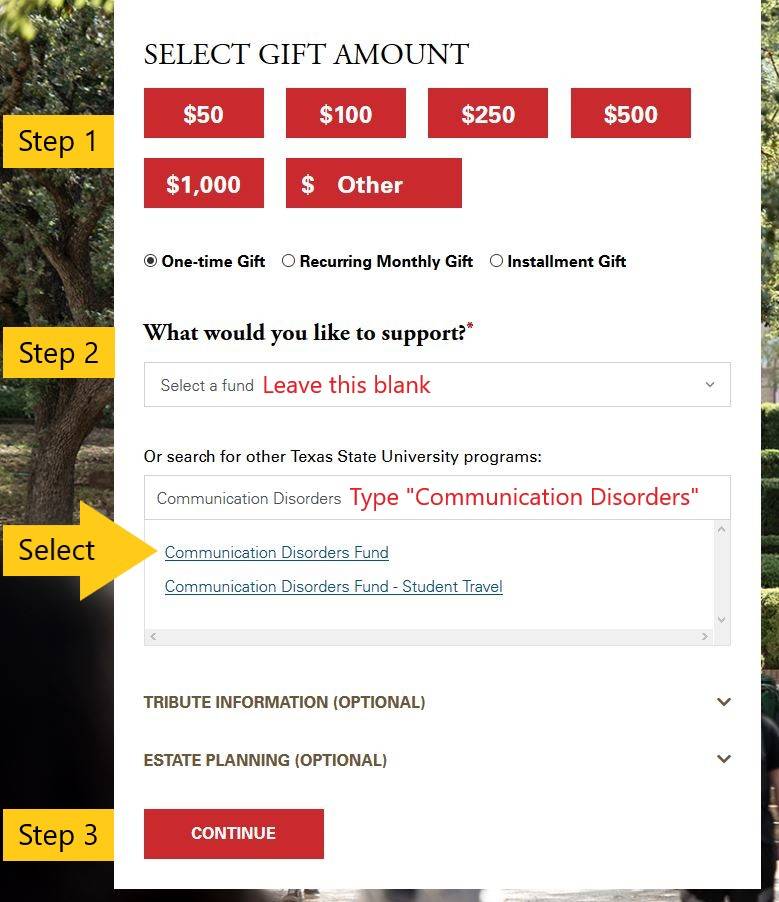Graduate Program FAQs
-
Regarding Pre-Requisites and Requirements
-
How do I know if the courses I took for my undergraduate degree (or leveling coursework) are equivalent to the required courses at Texas State University?
Visit our website www.health.txstate.edu/cdis, go to the Admissions tab, and select Course Equivalents. There you will find a list of universities. By selecting the university you attended, you will be able to view the course equivalents.
-
How many pre-requisite courses can I be lacking when applying to your program?
We prefer that you not lack any courses, however, you will still be considered if you lack Neurology, Aural Rehab, or Development Across the Lifespan. -
Are observational hours required before application into your graduate program?
No, but they are highly recommended as you will need to have them for ASHA certification.
-
-
Regarding Application Process
-
When is the deadline to submit the application the graduate program?
The application deadline for the graduate program is January 31st
-
May I submit my application after the deadline?
No, we cannot make exceptions as it would be unfair to the other applicants.
-
How does the admissions committee review the applications?
The admissions committee ranks the applicants by using a formula which takes into account: CDIS G.P.A., last 60 hours G.P.A., 3 letters of recommendation and letter of intent. The rankings range from 0-50; we start sending the letters of admission once the review process has been completed. Admissions letters are sent until our program is full. Letters of denial do not go out until the program is filled to capacity.
-
I did not receive my undergraduate degree in Communication Disorders from Texas State University, would my deadline be April 1st or Jan 31st?
The deadlines are: January 31st for the Master’s Program if you earned an undergraduate degree in Communication Disorders from any university and April 1st for the Graduate Leveling Program if you do not have an undergraduate degree in CDIS.
-
Do you need my GRE scores and will they impact my odds of being admitted into your program?
We do not require your GRE scores. However, keep in mind that if you plan on applying for academic scholarships offered by the Graduate College, they might require your GRE scores.
-
My university changed their grading system to A+, A, A-. How should I calculate my G.P.A.?
The Graduate College calculates the G.P.A. for you.
-
Do you prefer academic professors or work supervisors for my letters of recommendation?
We prefer faculty members, as this will give us a better idea of your strengths as a student. However, if work supervisors are your only option, that will do.
-
Can I send in more than three letters of recommendation?
Yes, but only three will be considered, and the first three letters received will be the only letters reviewed.
-
My professor had an emergency; can you please accept his/her letter of recommendation?
No, we cannot make exceptions as it would be unfair to the other applicants.
-
What are the minors/concentrations your department offers?
We offer 6 concentrations; Evidence-Based Practice in Autism, Evidence-Based Practice in Second Language Acquisition, Evidence-Based Practice in Stuttering, Evidence-Based Practice in Communication Disorders Across the Lifespan, Evidence-Based Practice in Neurogenic, Voice, & Swallowing (NVS) concentrates, and Evidence-Based Practice in Hearing and Related Disorders.
-
-
Regarding Post-Application
-
May I be informed as to how the Graduate Admissions Committee scored/ranked my application?
No, rankings are not shared with students.
-
Why have I not received my acceptance letter yet?
If your application was reviewed, then perhaps you are on the waiting list or we may have an outdated address if you did not notify us of a recent update.
-
Will I be notified if I am missing anything from my application package?
The department of Communication Disorders program will not inform you of any missing items. However, the graduate college will send you an email containing a username and password with which you will be able to login in at the website below and view your application status, what items of your application were received and when they were received, and if you are missing any items of the application.
-
When can I expect to hear of any decisions made regarding admission to the program?
Decisions regarding admission to the graduate program are finalized in April.
-
If I am not admitted, will I be considered if I re-apply?
If you are not admitted, you may re-apply and be newly considered for admission.
-
-
Regarding the Program
-
Can I be in enrolled part time in the graduate program?
No, the graduate program is a full time program.
-
Can I be employed and be enrolled in the full time program?
It is strongly recommended that you are not employed. The graduate program is intense and requires a lot of your time. However, it will be your sole decision.
-
Does the graduate program begin every semester?
No, the graduate program begins only during the fall semester.
-
Where can I find more information and statistics about Texas State's CDIS program?
CDIS ASHA Profile webpage has a comprehensive list of the most up-to-date statistics regarding the program, including total number of applicants and average GPA of those admitted to the graduate program.
Please visit the ASHA EdFind webpage to search other accredited institutions.
-
-
Other
-
How many applicants do you have per year and what was the average GPA for those admitted?
2020: 317 applicants, those admitted had an average G.P.A of 3.91
2021: 284 applicants, those admitted had an average G.P.A. of 3.81
2022: 271 applicants, those admitted had an average G.P.A. of 3.65
2023: 201 applicants, those admitted had an average G.P.A. of 3.86
-
Are my odds of getting into your graduate program improved if I retake some classes to raise my G.P.A.?
No.
-
How can I support the CDIS program?
Thank you for your consideration in donating to the Communication Disorders program!
- Please visit the Make A Gift webpage here.
- Select the Gift Amount.
- Leave the Fund field blank.
- Search "Communication Disorders Fund".
- Click Continue.
Thank you!

-

